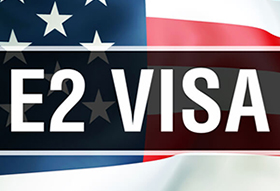The E-2 Investor Visa Program
The E-2 nonimmigrant classification allows a national of a treaty country (a country with which the United States maintains a treaty of commerce and navigation, or with which the United States maintains a qualifying international agreement, or which has been deemed a qualifying country by legislation) to be admitted to the United States when investing a substantial amount of capital in a U.S. business. Certain employees of such a person or of a qualifying organization may also be eligible for this classification.

The E-2 (E2) Treaty Investors visa is a nonimmigrant visa for nationals of countries with which the United States maintains a treaty of commerce and navigation who intend to enter the United States in order to invest their own funds (such that the invested funds are at risk) into a U.S. enterprise. The E2 visa is also available for certain employees of the principal E2 investor from the same country of nationality, or for employees of an individual or company abroad that would qualify as an E2 treaty investor. For those who are eligible, the E2 visa is a powerful tool for investing money in the United States. This article will explain the requirements for qualifying as an E2 Treaty Investor, the E2 treaty investor application process, and the rules for being on and maintaining E2 status (including derivative E2 visas for family members).
A significant amount of capital must be invested at a commercially controlled capacity with risk management factors. Eligibility for E-2 visa is available to foreign national recipients who are citizens of treaty countries as part of commerce and navigation initiatives established under the U.S. Department of State. Investors applying for an E2 visa outside of the U.S. are not required to file for a petition.
See U.S. Department of State’s Treaty Countries for a current list of countries with which the United States maintains a treaty of commerce and navigation.
More Investment Visas
None of the investor categories have language, education or business experience requirements.
